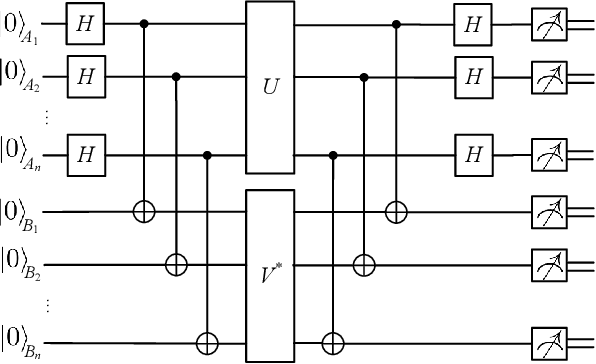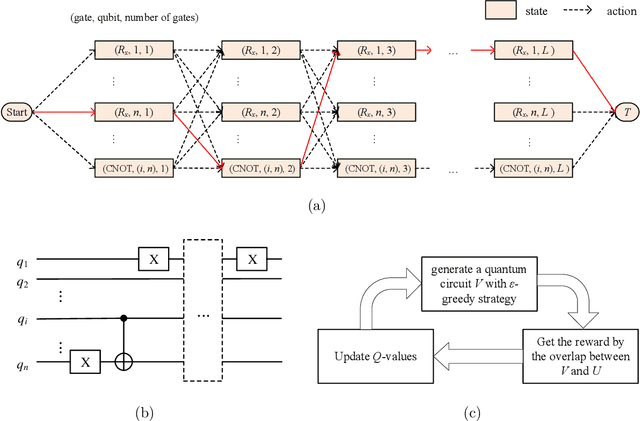Haozhen Situ
Overcoming Dimensional Factorization Limits in Discrete Diffusion Models through Quantum Joint Distribution Learning
May 08, 2025Abstract:This study explores quantum-enhanced discrete diffusion models to overcome classical limitations in learning high-dimensional distributions. We rigorously prove that classical discrete diffusion models, which calculate per-dimension transition probabilities to avoid exponential computational cost, exhibit worst-case linear scaling of Kullback-Leibler (KL) divergence with data dimension. To address this, we propose a Quantum Discrete Denoising Diffusion Probabilistic Model (QD3PM), which enables joint probability learning through diffusion and denoising in exponentially large Hilbert spaces. By deriving posterior states through quantum Bayes' theorem, similar to the crucial role of posterior probabilities in classical diffusion models, and by learning the joint probability, we establish a solid theoretical foundation for quantum-enhanced diffusion models. For denoising, we design a quantum circuit using temporal information for parameter sharing and learnable classical-data-controlled rotations for encoding. Exploiting joint distribution learning, our approach enables single-step sampling from pure noise, eliminating iterative requirements of existing models. Simulations demonstrate the proposed model's superior accuracy in modeling complex distributions compared to factorization methods. Hence, this paper establishes a new theoretical paradigm in generative models by leveraging the quantum advantage in joint distribution learning.
Continual learning of quantum state classification with gradient episodic memory
Mar 26, 2022



Abstract:Continual learning is one of the many areas of machine learning research. For the goal of strong artificial intelligence that can mimic human-level intelligence, AI systems would have the ability to adapt to ever-changing scenarios and learn new knowledge continuously without forgetting previously acquired knowledge. A phenomenon called catastrophic forgetting emerges when a machine learning model is trained across multiple tasks. The model's performance on previously learned tasks may drop dramatically during the learning process of the newly seen task. Some continual learning strategies have been proposed to address the catastrophic forgetting problem. Recently, continual learning has also been studied in the context of quantum machine learning. By leveraging the elastic weight consolidation method, a single quantum classifier can perform multiple tasks after being trained consecutively on those tasks. In this work, we incorporate the gradient episodic memory method to train a variational quantum classifier. The gradient of the current task is projected to the closest gradient, avoiding the increase of the loss at previous tasks, but allowing the decrease. We use six quantum state classification tasks to benchmark this method. Numerical simulation results show that better performance is obtained compared to the elastic weight consolidation method. Furthermore, positive transfer of knowledge to previous tasks is observed, which means the classifier's performance on previous tasks is enhanced rather than compromised while learning a new task.
Variational quantum compiling with double Q-learning
Mar 22, 2021



Abstract:Quantum compiling aims to construct a quantum circuit V by quantum gates drawn from a native gate alphabet, which is functionally equivalent to the target unitary U. It is a crucial stage for the running of quantum algorithms on noisy intermediate-scale quantum (NISQ) devices. However, the space for structure exploration of quantum circuit is enormous, resulting in the requirement of human expertise, hundreds of experimentations or modifications from existing quantum circuits. In this paper, we propose a variational quantum compiling (VQC) algorithm based on reinforcement learning (RL), in order to automatically design the structure of quantum circuit for VQC with no human intervention. An agent is trained to sequentially select quantum gates from the native gate alphabet and the qubits they act on by double Q-learning with \epsilon-greedy exploration strategy and experience replay. At first, the agent randomly explores a number of quantum circuits with different structures, and then iteratively discovers structures with higher performance on the learning task. Simulation results show that the proposed method can make exact compilations with less quantum gates compared to previous VQC algorithms. It can reduce the errors of quantum algorithms due to decoherence process and gate noise in NISQ devices, and enable quantum algorithms especially for complex algorithms to be executed within coherence time.
* 21 pages, 10 figures
 Add to Chrome
Add to Chrome Add to Firefox
Add to Firefox Add to Edge
Add to Edge